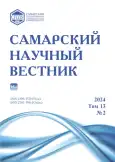Энактивизм и развитие эпистемической культуры педагогов-психологов в магистратуре
- Авторы: Васильева Т.В.1
-
Учреждения:
- Московский городской педагогический университет
- Выпуск: Том 13, № 2 (2024)
- Страницы: 166-170
- Раздел: Педагогические науки
- URL: https://bakhtiniada.ru/2309-4370/article/view/271357
- DOI: https://doi.org/10.55355/snv2024132302
- ID: 271357
Цитировать
Полный текст
Аннотация
Эпистемическая культура, основанная на принципах энактивизма, становится важным компонентом профессионального становления специалиста (выпускника программ психолого-педагогической магистратуры), позволяя педагогам-психологам не только интегрировать разнообразные знания и практики, но и активно участвовать в их формировании. В условиях глобальных изменений и вызовов, с которыми сталкивается современное общество, энактивизм становится важным инструментом для достижения качественного образования и подготовки будущих специалистов. В статье рассмотрена сущность современного энактивизма как философского направления и его значимость для развития эпистемической культуры педагогов-психологов, обучающихся в магистратуре; приведены постулаты (постулат о неразделимости субъекта и объекта; постулат о когнитивности как действии; постулат о коразвитии; постулат о воплощенности, или постулат о эмбодименте) и принципы (принцип когнитивного симбиоза; принцип конструирования знаний; принцип значимости опыта и взаимодействия; принцип динамичности знаний) энактивного подхода к проектированию и реализации образовательного процесса магистратуры. Автор делает вывод: энактивистская философия познания, будучи включенной в систему магистерской подготовки педагогов-психологов, способствует становлению их эпистемической культуры, характеризующейся рефлексивностью, креативностью, холистичностью, открытостью к диалогу, взаимодействию и сотрудничеству, что, в свою очередь, обеспечивает высокое качество психолого-педагогического сопровождения личности в условиях нарастающей сложности и неопределённости современного мира.
Ключевые слова
Полный текст
Открыть статью на сайте журналаОб авторах
Татьяна Виталиевна Васильева
Московский городской педагогический университет
Автор, ответственный за переписку.
Email: tvvasilyeva87@gmail.com
кандидат педагогических наук, доцент кафедры психологии образования
Россия, МоскваСписок литературы
- Васильева Т.В., Банников В.А. О необходимости формирования в системе непрерывного профессионального образования эпистемической культуры у педагогов-психологов в условиях информатизации современного российского общества // Педагогический научный журнал. 2023. Т. 6, № 6. С. 23–28.
- Князева Е.Н. Энактивизм: концептуальный поворот в эпистемологии // Вопросы философии. 2013. № 10. С. 91–104.
- Hutto D.D. From radical enactivism to folk philosophy // The Philosophers’ Magazine. 2020. Iss. 88. P. 75–82. doi: 10.5840/tpm20208815.
- Князева Е.Н. Энактивизм: новая форма конструктивизма в эпистемологии. М.; СПб.: Центр гуманитарных инициатив; Университетская книга, 2014. 352 с.
- Ополев П.В. Энактивизм как эпистемология наук о сложном // Омский научный вестник. Серия: Общество. История. Современность. 2023. Т. 8, № 1. С. 118–126. doi: 10.25206/2542-0488-2023-8-1-118-126.
- Лебедев С.А., Назаров А.А. Конструктивистская концепция чувственного познания // Журнал философских исследований. 2022. Т. 8, № 1. С. 3–11.
- Черникова И.В., Черникова Д.В. Конструктивистские схемы в современной теории познания: эволюционный конструктивизм // Вестник Томского государственного университета. Философия. Социология. Политология. 2018. № 42. С. 14–24. doi: 10.17223/1998863x/42/2.
- Coe R., Aloisi C., Higgins S., Major L.E. What makes great teaching? Review of the underpinning research. London: The Sutton Trust, 2014. 57 p.
- Nikitina N.I., Galkina T.E., Agronina N.I., Tolstikova S.N., Grebennikova V.M. Personalized approach to professional development of «helping» professions specialists // Mediterranean Journal of Social Sciences. 2015. Т. 6, № 5 S4. P. 437–445.
- Васильева Т.В. Вариативные подходы к раскрытию сущности понятия «эпистемическая культура педагога-психолога» // Повышение качества профессиональной подготовки трудовых ресурсов: полипарадигмальный подход: мат-лы II междунар. науч.-практ. конф. (г. Краснодар, 28.03.2024 г.). Краснодар: Перспектива, 2024. С. 21–24.
- Вольхин С.Н., Никитина Н.И., Васильева Т.В. Антропологический подход к формированию эпистемической культуры педагогов-психологов в системе непрерывного профессионального образования // ЦИТИСЭ. 2023. № 3 (37). С. 424–434. doi: 10.15350/2409-7616.2023.3.35.
- Antoniades A. Epistemic communities, epistemes and the construction of (world) politics // Global Society. 2003. Vol. 17, iss. 1. P. 21–38. doi: 10.1080/0953732032000053980.
- Рокмор Т. Постнеклассическая концепция науки В.С. Степина и эпистемологический конструктивизм // Человек. Наука. Цивилизация. К семидесятилетию академика В.С. Степина. М.: Канон+, 2004. С. 248–260.
- Симонова Ж.Г. Формирование познавательной активности студентов-культурологов в процессе изучения иностранного языка на основе эпистемического подхода: автореф. дис. … канд. пед. наук: 13.00.01. Курск, 2009. 25 с.
- Конструктивизм в теории познания / отв. ред. В.А. Лекторский. М.: ИФ РАН, 2008. 171 с.
Дополнительные файлы






